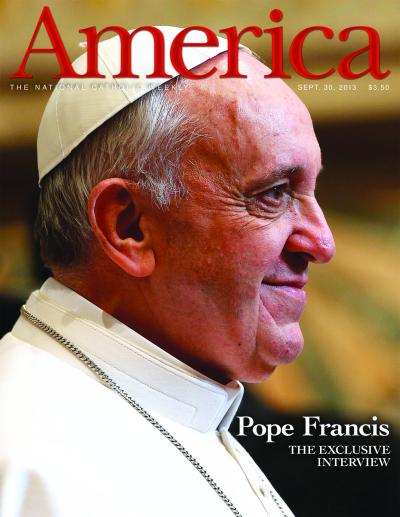
Pope Francis Extends Message of Tolerance for LGBT People, Women and Abortion
In a stunning interview released by Jesuit journals in 16 countries on Thursday, Pope Francis continued his message of tolerance towards LGBT people. Clarifying earlier remarks on gay clergymen (“Who am I to judge?”), Pope Francis noted that his statement extended to all gay people, not just priests. Although no change in policy has been proposed, the Pope’s remarks further signal a significant departure in tone and style from predecessors.
In the interview with Rev. Antonio Spadaro, editor of Rome journal La Civilta Cattolica, Pope Francis said that he had received numerous letters from lesbians and gays who said that they were “socially wounded” by the church. “The church does not want to do this,” said Pope Francis. Expressing concern over the threat that social issues like abortion, contraception, and marriage equality present to the future of the Catholic Church, he stated, “We have to find a new balance, otherwise… the moral edifice of the church is likely to fall like a house of cards, losing the freshness and fragrance of the Gospel.”

Cover of America, the national Catholic review journal responsible for the English translation of Pope Francis’ interview.
Throughout the interview, Pope Francis admonished the church several times for its narrow focus on social issues, noting that the church’s teaching should not be a “disjointed multitude of doctrines to be imposed insistently.” He said, “The church sometimes has locked itself up in small things, in small-minded rules. The most important thing is the first proclamation: Jesus Christ has saved you. And the ministers of the church must be ministers of mercy above all.”
As James Martin, editor at large of America, pointed out, Pope Francis’ statements harken back to the traditional theology of a “hierarchy of truths,” a kind of ladder of beliefs in order of their importance. For example: if a Catholic disagrees with an individual sermon given by their priest on a particular biblical passage, that is less serious than, say, disagreeing with the church’s fundamental teaching that Jesus is the son of God. Pope Francis is not saying that the church has changed its teaching on homosexuality; only that it is of lesser importance than other church teachings, and that LGBT people can still be accepted as Catholic. “Religion has the right to express its opinion in the service of the people, but God in creation has set us free: it is not possible to interfere spiritually in the life of a person,” said Pope Francis.

Pope Francis at the Vatican on Wednesday, September 18. (Tiziana Fabi, AFP, Getty Images via LA Times)
On the issue of abortion, Pope Francis said that discernment is key. When applying the teachings of the church, the most important thing is to help people move forward in their Christian lives, motivated to do better. “When we speak about these issues, we have to talk about them in a context. The teaching of the church, for that matter, is clear and I am a son of the church, but it is not necessary to talk about these issues all the time,” said Pope Francis.
Pope Francis clearly rejected the ordination of women to the priesthood, but he did urge the church to further investigate the role of women. “The feminine genius is needed wherever we make important decisions,” said Pope Francis. “Women are asking deep questions that must be addressed. The church cannot be herself without the woman and her role.”
As before, it remains to be seen how the rest of the church responds to the Pope’s message. (In the past two months, we’ve seen a little bit of good news and a whole lot of intolerance.) Based on Pope Francis’s remarks, many Catholics feel optimistic about what lies ahead. Said Pope Francis, “Many think that changes and reforms can take place in a short time. I believe that we always need time to lay the foundations for real, effective change. And this is the time of discernment.”
Dr. Arthur Fitzmaurice, Resource Director of the Catholic Association for Lesbian and Gay Ministry, is enthusiastic to have a pope who feels the same way he does. “He said that we must heal the broken and not begin any conversation with condemnation. That is exactly how CALGM operates, setting the table for all who are looking for a place in the Church and not refusing anyone access to the love of God or the love of a faith community,” said Fitzmaurice. “We hope Pope Francis’ remarks will begin the healing process for many gay and lesbian Catholics who have felt alienated by the Church.”